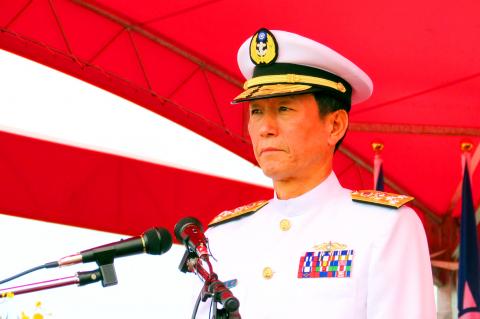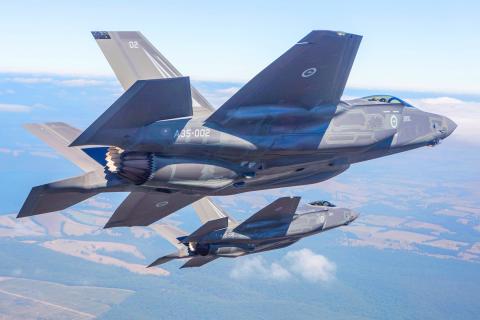The Ministry of National Defense yesterday confirmed President Tsai Ing-wen’s (蔡英文) appointment of Deputy Minister of National Defense Lee Hsi-ming (李喜明) as the nation’s new chief of the general staff, among a reshuffle of positions at the top of the military and the ministry.
Lee is to fill the position left vacant by Chief of the General Staff Chiu Kuo-cheng (邱國正), who assumed the post in December last year, but will reach the retirement age of 64 for the position by the end of this month.
Chiu turned down an invitation to extend his term, saying that the system of elevation of rank should be respected and that he would be retiring at the end of this month, sources who requested anonymity said.

Photo: CNA
Lee’s ministry post is to be filled by another admiral, Deputy Chief of the General Staff Pu Tze-chun (蒲澤春), while Deputy Commander of the Army Lieutenant General Chen Pao-yu (陳寶餘) is to take over from Pu and be promoted to general.
Deputy Minister of National Defense General Cheng Te-mei (鄭德美) is to transfer to the Presidential Office to act as Tsai’s strategic adviser, the ministry said in a statement, adding that Chungshan Institute of Science and Technology president Chang Guan-chung (張冠群) would fill Cheng’s position and would be promoted to general.
Chang’s promotion would be the first time an academic has taken a post as deputy minister of national defense, the sources said.

Photo: AFP
The reassignments are set to take effect on May 1.
Meanwhile, Minister of National Defense Feng Shih-kuan (馮世寬) yesterday told a meeting of the legislature’s Foreign Affairs and Defense Committee that the ministry would formally declare its intention to procure Lockheed Martin F-35 jets to US officials in July when Washington is expected to finalize its appointment of Taiwan affairs officials.
Asked by Democratic Progressive Party Legislator Lo Chih-cheng (羅致政) if the ministry would be seeking F-35s, Feng said that the ministry “has such a plan in response to the enemy’s military development.”
“Because the appointments of [US] officials have not yet been completed, [a formal proposal] would be made to Washington in July,” he said.
The military wants F-35s because their short takeoff and vertical landing capabilities, as well as their advanced stealth features, would allow the air force to retain combat capacity should its air bases be destroyed.
The attempt to acquire F-35s became the main topic of yesterday’s legislative session after the ministry announced that it would test the nation’s defensive capabilities with F-35s factored in during the computer simulation in this year’s Han Kuang exercises.
The simulation would be based on the cross-strait military balance in 2025, when Chinese People’s Liberation Army is expected to have three aircraft carriers and a fleet of Sukhoi Su-35 jets, Lieutenant General Chiang Chen-chung (姜振中) said.

Tropical Storm Gaemi strengthened into a typhoon at 2pm yesterday, and could make landfall in Yilan County tomorrow, the Central Weather Administration (CWA) said yesterday. The agency was scheduled to issue a sea warning at 11:30pm yesterday, and could issue a land warning later today. Gaemi was moving north-northwest at 4kph, carrying maximum sustained winds near its center of up to 118.8kph and gusts of 154.8kph. The circumference is forecast to reach eastern Taiwan tomorrow morning, with the center making landfall in Yilan County later that night before departing from the north coast, CWA weather forecaster Kuan Shin-ping (官欣平) said yesterday. Uncertainty remains and

SEA WARNING LIKELY: The storm, named Gaemi, could become a moderate typhoon on Wednesday or Thursday, with the Taipei City Government preparing for flooding A tropical depression east of the Philippines developed into a tropical storm named Gaemi at 2pm yesterday, and was moving toward eastern Taiwan, the Central Weather Administration (CWA) said. Gaemi could begin to affect Taiwan proper on Tuesday, lasting until Friday, and could develop into a moderate typhoon on Wednesday or Thursday, it said. A sea warning for Gaemi could be issued as early as Tuesday morning, it added. Gaemi, the third tropical storm in the Pacific Ocean this typhoon season, is projected to begin moving northwest today, and be closest to Taiwan on Wednesday or Thursday, the agency said. Today, there would likely

DISRUPTIONS: The high-speed rail is to operate as normal, while several airlines either canceled flights or announced early departures or late arrivals Schools and offices in 15 cities and counties are to be closed today due to Typhoon Gaemi, local governments announced last night. The 15 are: Taipei, New Taipei City, Taoyuan, Tainan, Keelung, Hsinchu and Kaohsiung, as well as Yilan, Hualien, Hsinchu, Miaoli, Chiayi, Pingtung, Penghu and Lienchiang counties. People should brace for torrential rainfall brought by the storm, with its center forecast to make landfall on the east coast between tonight and tomorrow morning, the Central Weather Administration (CWA) said. The agency issued a sea warning for the typhoon at 11:30pm on Monday, followed by a land warning at 11:30am yesterday. As of

CASUALTY: A 70-year-old woman was killed by a falling tree in Kaohsiung as the premier warned all government agencies to remain on high alert for the next 24 hours Schools and offices nationwide are to be closed for a second day today as Typhoon Gaemi crosses over the nation, bringing torrential rain and whipping winds. Gaemi was forecast to make landfall late last night. From Tuesday night, its outer band brought substantial rainfall and strong winds to the nation. As of 6:15pm last night, the typhoon’s center was 20km southeast of Hualien County, Central Weather Administration (CWA) data showed. It was moving at 19kph and had a radius of 250km. As of 3pm yesterday, one woman had died, while 58 people were injured, the Central Emergency Operation Center said. The 70-year-old